Introduction
Since it was first delivered, Swamiji’s iconic “Response to Welcome” speech on September 11, 1893, at the Parliament of Religions in Chicago has been read, re-read, dissected, analyzed, and its every word scrutinized ad infinitum. Most people who were involved in these activities sought out the first volume of the Complete Works of Swami Vivekananda as the authoritative source.1 Another version of the speech appears in volume nine of the same series. This second version is a combination composed by Marie Louise Burke, who took the reports of the speech from four major Chicago newspapers and synthesized them to arrive at what the vast audience might have actually heard from Swamiji’s lips.2 . A recent article in The Vedanta Kesari has compared the two versions in details by conflating the texts and then discussing the relative merits of each version. The author calls the first one “the short version,” and the second “the long version.”3 That is how they will be referred to hereafter.
This article will document the sources of the two versions for present and future use. It will also present some background information on the sources and analyse them to help the readers understand the how’s and why’s of the process that led to the two versions.
Chicago newspapers of 1893
Before we go into the various reports of the speech, let us look at the “major” daily newspapers in Chicago at the time, keeping in mind that the names of the newspapers had a tendency to change slightly within a short span of time due to mergers or for other reasons:4
Newspapers Time published
Chicago Daily News Evening
The Chicago Dispatch Evening
The Chicago Evening Journal Evening
The Chicago Evening Post Evening
Chicago Daily Globe Morning
The Chicago Herald Morning
The Daily Inter Ocean Morning
Chicago Mail Evening
The Chicago Times Morning
The Chicago Daily Tribune Morning
The Chicago Record Morning
The five morning papers whose microforms are presently available in the key Chicago libraries are: The Chicago Herald, The Chicago Daily Tribune, The Daily Inter Ocean, The Chicago Record, and Chicago Times. For brevity, these will henceforth be referred to as Herald, Tribune, Inter Ocean, Record, and Times. These covered the Parliament of Religions proceedings with varying degrees of detail, and frequently reported on Swamiji and his speeches; the Herald was undoubtedly the most comprehensive of them all; the Inter Ocean was next. All of them had one thing in common— they were all morning newspapers. The evening newspapers gave the Parliament only a cursory coverage. Since the evening papers were usually published by 5 p.m., they mostly reported on the morning programs, and that too in a rather perfunctory manner. Since most of Swamiji’s Parliament and Scientific Section speeches were during the late morning, afternoon, or evening sessions, the evening papers rarely mentioned them.
On September 12, four out of the five newspapers mentioned above reported on Swamiji’s maiden speech. We will get to those later. The Times, which had devoted to the Parliament proceedings three columns on September 12 under the heading “Men of Many Faiths,” reported on the morning session, but had only this to say about the afternoon session, when Swamiji spoke: “In the afternoon another session was held, and many addresses were made by distinguished representatives of the religions of the world.” In describing the representatives on the platform, the Times, however, wrote the following:
“The face and dress which attracted the most notice, especially from the ladies, was that of Suami [sic] Vivekananda, a young man exceptionally handsome and with features which would command attention anywhere. His dress was bright orange, and he wore a long coat and regulation turban of that color. Vivekananda is a Brahmin monk, and Prof. Wright of Harvard is quoted as saying that he is one of the best educated young men in the world.”
The Times didn’t even care to report on the speech by “one of the best educated young men in the world” who “would command attention anywhere.” The loss is theirs, but what is intriguing is how they came to know about the John Henry Wright quotation. Swamiji had Prof. Wright’s introductory letter (his only credential) with him, which probably mentioned in it the quoted words. But how did the reporter get hold of it? Swamiji was in circulation in Chicago only for a little over a day! We may never know the answer to that.
The speech as reported by four newspapers (September 12, 1893)
The Herald
Most Ancient Order of Monks
Swami Vivekananda, of Bombay, India, was introduced after Rev. A. W. Momerie, of England, had spoken briefly. When Mr. Vivekananda had addressed the audience as “sisters and brothers of America,” there arose a peal of applause that lasted for several minutes. He spoke as follows:
It fills my heart with joy unspeakable to rise in response to the warm and cordial welcome which you have given us. I thank you in the name of the most ancient order of monks in the world; I thank you in the name of the mother of religions, and I thank you in the name of the millions and millions of Hindoo people of all classes and sects.
My thanks, also, to some of the speakers on this platform who have told you that these men from far off nations may well claim the honor of bearing to the different lands the idea of toleration. I am proud to belong to a religion which has taught the world both tolerance and universal acceptance. We believe not only in universal toleration, but we accept all religions to be true. I am proud to tell you that I belong to a religion into whose sacred language, the Sanscrit, the word seclusion is untranslatable. I am proud to belong to a nation which has sheltered the persecuted and the refugees of all religions and all nations of the earth. I am proud to tell you that we have gathered in our bosom the purest remnant of the Israelites, a remnant which came to southern India and took refuge with us in the very year in which their holy temple was shattered to pieces by Roman tyranny. I am proud to belong to the religion which has sheltered and is still fostering the remnant of the grand Zoroastrian nation. I will quote to you, brethren, a few lines from a hymn which I remember to have repeated from my earliest boyhood, which is every day repeated by millions of human beings: “As the different streams having their sources in different places all mingle their water in the sea, Oh, Lord, so the different paths which men take through different tendencies, various though they appear, crooked or straight, all lead to Thee.”
The present convention, which is one of the most august assemblies ever held, is in itself a vindication, a declaration to the world of the wonderful doctrine preached in Gita. “Whosoever comes to me, through whatsoever form I reach him, they are all struggling through paths that in the end always lead to me.” Sectarianism, bigotry, and its horrible descendant, fanaticism, have possessed long this beautiful earth. It has filled the earth with violence, drenched it often and often with human blood, destroyed civilization and sent whole nations to despair. Had it not been for this horrible demon human society would be far more advanced than it is now. But its time has come and I fervently hope that the bell that tolled this morning in honor of this convention be the death knell to all fanaticism, to all persecutions with the sword or the pen and to all uncharitable feelings between persons wending their way to the same goal.
—————x———————-x——————-x——————-
The Tribune
Is a Deathknell to Persecution.
Swami Vivekananda was next introduced [after Rev. Momerie]. He said:
It is my unspeakable joy to rise in response to the grand words of welcome given to us by you. I thank you in the name of the most ancient order of monks the world has ever seen. I thank you in the name of the mother religion of which Buddhism and Jainism are but the branches. I thank you in the name of that ancient monastic order, and I thank you finally in the name of the millions and millions of the Hindoo people of all castes and sects. My thanks to some of the speakers on this platform who have told us that these men from the various nations will bear to the different lands the idea of toleration which they may see here. My thanks to them for this idea.
Sectarianism, bigotry, and its horrible descendant, fanaticism, have filled the earth with violence, drenched it often and often with human gore, destroyed civilization, and sent whole nations into despair. Had it not been for this horrible demon society would have been much farther advanced than it is. But its time has come and I fervently believe that the bell that tolled this morning in honor of the representatives of the different religions of the earth, in this parliament assembled, is the death-knell to all fanaticism [applause], that it is the death-knell to all persecution with the sword or the pen, and to all uncharitable feelings between brethren wending their way to the same goal, but through different ways. [Applause].
—————x———————-x——————-x——————-
The Inter Ocean
Suami Vivekenda [sic]
Said the chairman: “Great Britain is great indeed, great on the floor of this parliament. We are to hear again from the empire of India, and I am glad to present to this assembly Suami Vivekenda [sic]” [Applause.]
Suami Vivekenda said:
Sisters and brothers of America. [Great applause.] It is my unspeakable joy to rise in response to the grand words of welcome given to us by you. I thank you in the name of the most ancient order of monks the world has ever seen. I thank you in the name of the mother religion of which Buddhism and Janish [Jainism] are but the branches. I thank you in the name of that ancient 22The Vedanta Kesari March 2020 monastic order, and I thank you finally in the name of the millions and millions of the Hindoo people of all castes and tects [sects]. My thanks to some of the speakers on this platform who have told us that these men from the various nations will bear to the different lands the idea of toleration which they may see here. My thanks to them for this idea. I am proud to tell you that I belong to a religion in whose sacred language, the Sanscrit, constitution is untranslatable. [Applause.] I am proud to belong to a nation whose religion sheltered the persecuted and the refugees from all parts of the earth. I am proud to tell you that we have carried in our bosom the purest remnant of the Israelites who came to Southern India and took refuge with us in the very year in which their holy temple was shattered to pieces by Roman tyranny.
I will quote to you, brothers, a few lines from a hymn which every Hindoo child repeats every day. I feel that the very spirit of this hymn, which I remember to have repeated from my earliest boyhood, which is every day repeated by millions and millions of men in India, has at last come to be realized. The present convention, which is one of the most august assemblies as ever held, is in itself an indication, a declaration to the West of the wonderful doctrine preached in India.
Sectarianism, bigotry, and its horrible descendant, fanaticism, has filled the earth with violence, drenched it often and often with human gore, destroyed civilization and sent whole nations into despair. Had it not been for this horrible demon society would have been much farther advanced than it is. But its time has come, and I fervently believe that the bell that tolled this morning in honor of the representatives of the different religions of the earth, in this parliament assembled, is the death knell to all fanaticism. [Applause.] That it is the death knell to all persecution with the sword or the pen, and to all uncharitable feelings between brethren wending their way to the same goal, but through different ways. [Applause.]
—————x———————-x——————-x——————-
The Record
Swami Dviva Kananda [sic], India: “I thank you in the name of the most ancient religion; I thank you in the name of that ancient monastic order of which Gautama was only a member, and finally I thank you in the name of the great Hindoo people. I claim a religion in which the word persecution is untranslatable. I am proud to belong to a nation which has been the refuge of the persecuted. The bell that tolled this morning was the death-knell of all fanaticism, the death-knell to persecution with sword and pen of brethren who are wending their way to the same good, but by different ways.
—————x———————-x——————-x——————-
The speech as reported in Barrows’ book (“Barrows version”)
Swami Vivekananda, of Bombay, was next introduced. When Mr. Vivekananda addressed the audience as “sisters and brothers of America,” there arose a peal of applause that lasted for several minutes. He spoke as follows:
Speech of Mr. Vivekananda
It fills my heart with joy unspeakable to rise in response to the warm and cordial welcome which you have given us. I thank you in the name of the most ancient order of monks in the world; I thank you in the name of the mother of religions; and I thank you in the name of millions and millions of Hindu people of all classes and sects.
My thanks, also, to some of the speakers on this platform who have told you that these men from far-off nations may well claim the honor of bearing to the different lands the idea of toleration. I am proud to belong to a religion which has taught the world both tolerance and universal acceptance. We believe not only in universal toleration, but we accept all religions to be true. I am proud to tell you that I belong to a religion into whose sacred language, the Sanskrit, the word exclusion is untranslatable. I am proud to belong to a nation which has sheltered the persecuted and the refugees of all religions and all nations of the earth. I am proud to tell you that we have gathered in our bosom the purest remnant of the Israelites, a remnant which came to southern India and took refuge with us in the very year in which their holy Temple was shattered to pieces by Roman tyranny. I am proud to belong to the religion which has sheltered and is still fostering the remnant of the grand Zoroastrian nation. I will quote to you, brethren, a few lines from a hymn which I remember to have repeated from my earliest boyhood, which is every day repeated by millions of human beings: “As the different streams having their sources in different places all mingle their water in the sea, so, O Lord, the different paths which men take through different tendencies, various though they appear, crooked or straight, all lead to thee.”
The present Convention, which is one of the most august assemblies ever held, is in itself a vindication, a declaration to the world of the wonderful doctrine preached in the Gita: “Whosoever comes to me, through whatsoever form I reach him, they are all struggling through paths that in the end always lead to me.” Sectarianism, bigotry and its horrible descendant, fanaticism, have possessed long this beautiful earth. It has filled the earth with violence, drenched it often and often with human blood, destroyed civilization and sent whole nations to despair. Had it not been for this horrible demon, human society would be far more advanced than it is now. But its time has come, and I fervently hope that the bell that tolled this morning in honor of this convention may be the death knell to all fanaticism, to all persecutions with the sword or the pen, and to all uncharitable feelings between persons wending their way to the same goal.5
Discussion of the reports
Now that we have here all the four available reports on the speech (readers can consult the Complete Works of Swami Vivekananda for the “short” and the “long” versions), we can address them individually and compare them with each other and the “short version,” which is the generally accepted version. It is important to mention here that, based on the existing hard copies and microforms, these were the only four newspapers that reported on the speech.
The Herald report is the longest and the most important one, because that was the mother-source for the “short version” of the speech. However, Barrows’ book, The World’s Parliament of Religions, published in 1893, first included this report with very minimal editing, as we can see. The significant difference between the two is one word in the sentence (see the Herald report): “I am proud to tell you that I belong to a religion into whose sacred language, the Sanscrit, the word seclusion is untranslatable.” The word is “seclusion” in the Herald version and “exclusion” in the Barrows version. The two words are somewhat similarsounding but, between the two, “exclusion” definitely makes more sense in the context. It is interesting to note that the Inter Ocean used in that place the word “constitution”, which doesn’t make any sense, and the Record “persecution.” This brings up the question: “What exact word did Swamiji say that was untranslatable in Sanskrit?”
It appears that he said “persecution.” According to the Inter Ocean, there was applause at the end of the sentence in question (there could have been applause after the previous sentence that ended with: “we accept all religions to be true”), so it is possible that the representatives of the Herald and Inter Ocean didn’t hear the word properly (the Tribune had that word in its headline) due to noise from the audience, but the representative of the Record did. Phonetically, “persecution” is closer to “seclusion” and “constitution” than is “exclusion.” Moreover, according to the three reports that mentioned the sentence, Swamiji went into the subject of the “persecuted” and “refugees” (“of all religions and all nations”) next. In that context, by “persecution” he must have meant religious persecution.
Eminent Sanskrit scholars have been contacted to find out if there is an equivalent word in Sanskrit for “religious persecution.” After considerable research into the matter, one such scholar concluded: “Sanskrit language as such—right from the period of the Vedas—did not have a word for religious persecution.” *
We therefore conclude that what Swamiji said was: “I am proud to tell you that I belong to a religion into whose sacred language, the Sanskrit, the word persecution is untranslatable.” And he was right.
When the “short version” was compiled years later, around 1907, by further editing the Barrows version, the sentence in question was included, but was eliminated later.6 The decision to eliminate it was probably prompted by the uncertainty surrounding the “untranslatable” word, which had four significantly different versions floating around in the media, although there could have been other reasons.
The Tribune report is considerably shorter than the Herald’s, but it has a reference to Buddhism and Jainism that is absent in the latter. The Inter Ocean report, which is closer to the Herald report in its length and content, also had a similar reference.
The Record’s report is totally inadequate. First, it massacred Swamiji’s name (and so did the Inter Ocean). Second, it brought up Gautama’s name, which was not in the other three reports (although two of them referred to Buddhism). Dropping items that are in the other reports is understandable, but adding something that is not in the others is questionable. Since it is a live speech that is being reported, you edit things out, not in. But the Record, however, did get the word “persecution” right!
Interestingly, in the “long version,” Marie Louise Burke used for her synthesis materials that are both common and unique in the four newspaper reports, as she had proposed to do, but used the word “exclusion,” which none of the reports used; it was taken from the Barrows version. For reasons best known to herself, Burke didn’t mention the other three versions of the word.
Concluding remarks
One wishes that there had been arrangements to record the speeches on wax cylinders, a technology that was then available. Then we could hear Swamiji’s sonorous voice as he spoke, with all the correct inflections, syntax, and tone. But there is no indication that there was any such arrangement. Even if the speeches had been recorded, the shelf life of the cylinders would have been short, or there could have been other technical issues. ** It is unfortunate that more newspapers didn’t follow the Herald’s lead in reporting on the speech. Even if they had done so, it is also unfortunate that the hard copies of all extant newspapers of that date (September 12, 1893) are no longer available; some were never microfilmed before they disintegrated or disappeared. So, we have to be satisfied with the “short” and the “long” versions, along with their sources. Both versions reflect the mastery of the speaker in terms of organization, sentiment, train of thought, poise, confidence, and, finally, eloquence.
Notes
* Does the Sanskrit language have a word for ‘persecution’?
From among the major Sanskrit-English dictionaries, Monier Williams Sanskrit Dictionary has this entry: To PERSECUTE, v. a. बाध्(c. 1. बाधते –धितुं), प्रबाध्, परिबाध्, प्रतिबाध्, बाधार्थम् or द्रोहार्थम् अनुमृ (c. 1. –सरति –सर्त्तुं, c. 10. –मारयति –यितुं), द्वेषपूर्व्वम् अनुसृ, द्रुह् (c. 4. द्रुह्यति, द्रोहितुं), क्लिश् (c. 9. क्लिश्नाति क्लेशितुं), क्लेशं or द्रोहं कृ, अभिद्रोहं कृ, उपद्रवं कृ
But is the word connected to persecution based on religion?
The Apte Sanskrit dictionary gives असचद्विष्. – Persecuting those who are not (his) worshippers. For the same entry Monier Williams quoting a Rig Veda mantra states the following: असचद्विष्/ अ-सचद्विष् mfn. hating or persecuting the non-worshippers ([ BR. Gmn. ]) or not persecuting worshippers([ NBD. ]) RV. viii , 20 , 24 (voc.)
This term appears just only once in the entire Rigveda Samhita in the 8th Mandala 20th Sukta and 24th Mantra of the Rigveda. This is a mantra on the Maruts. The Maruts are praised as असचद्विषः
When read with the Sayana Acharya Commentary, which is the traditional authority in understanding the Vedas, the meaning of the mantra appears as: असचद्विषः असक्तशत्रवः शत्रुरहिताः –Those who are bereft of enemies or Those about whom the enemies are disinclined (to fight). Hence, the meaning given by the dictionaries to the term असचद्विषः is incorrect. Unless we find other contradicting evidences, we can conclude that Swamiji was correct in stating that the Sanskrit language as such – right from the period of the Vedas – did not have a word for religious persecution.
Monier Williams and Apte, probably merely looked into the etymology-root meanings and arrived at the meaning. But in determining the meaning of the Vedas, the meaning approved by the traditional commentators (who look into all the six Vedangas) carry more weightage than only grammatical analysis. Furthermore, the roots of the Vedic-Sanskrit words have many meanings, which may not be accounted fully in grammatical texts.
— Dr. M. Jayaraman, Director, Research Department, Krishnamacharya Yoga Mandiram,
Chennai; Member, Expert panel for Yoga, TKDL-CSIR, Govt of India
** That, of course, didn’t stop the enthusiasts from making stuff up and putting it on the Internet (https:// www.latestly.com/lifestyle/festivals-events/swami-vivekanandas-iconic-1893-speech-in-chicagowatch-full-video-audio-of-the-historic-address-at-the-us-parliament-of-worlds-religions-584029. html.) This article, further supported by Marie Louise Burke’s “long version,” clearly indicates that the Internet version of Swamiji’s first speech is counterfeit.}
References
1) The Complete Works of Swami Vivekananda. 1:3
2) Ibid., 9: 429-430.
3) “Two Versions of Swami Vivekananda’s First Chicago Speech,” William Page. The Vedanta Kesari, January 2019, pp. 24-26.
4) Authentic Visitors’ Guide to the World’s Columbian Exposition and Chicago. Richard J. Murphy. Chicago: The Union News Co., 1892, p. 50.
5) The World’s Parliament of Religions. John Henry Barrows. Parliament Publishing Co., 1893, Vol 1, pp. 101-102.
6) Personal communication with Swami Atmarupananda of Houston, TX.
Source : Vedanta Kesari, March, 2020

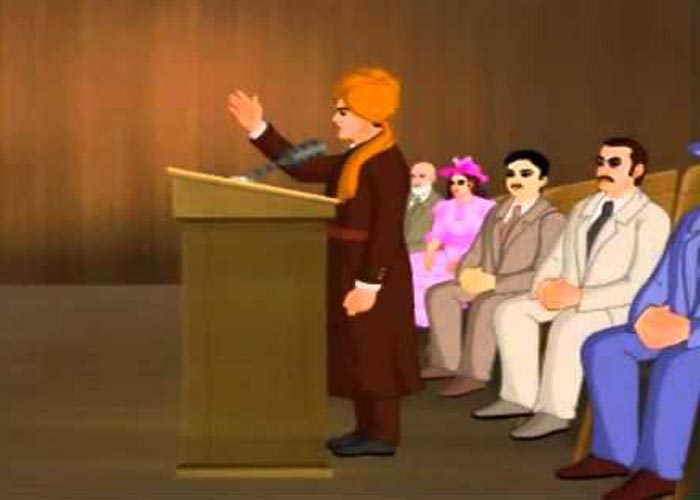
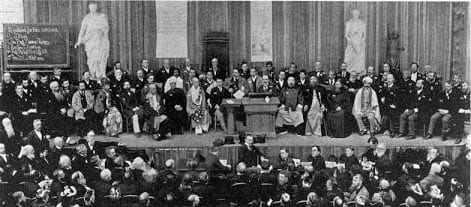
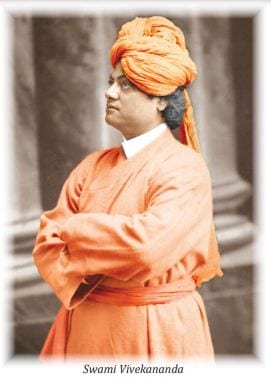
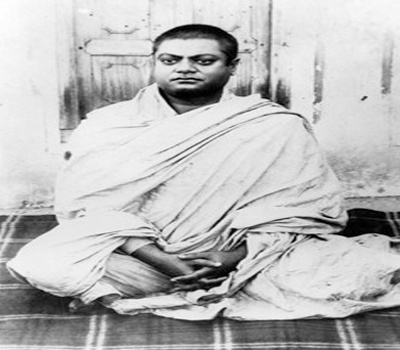

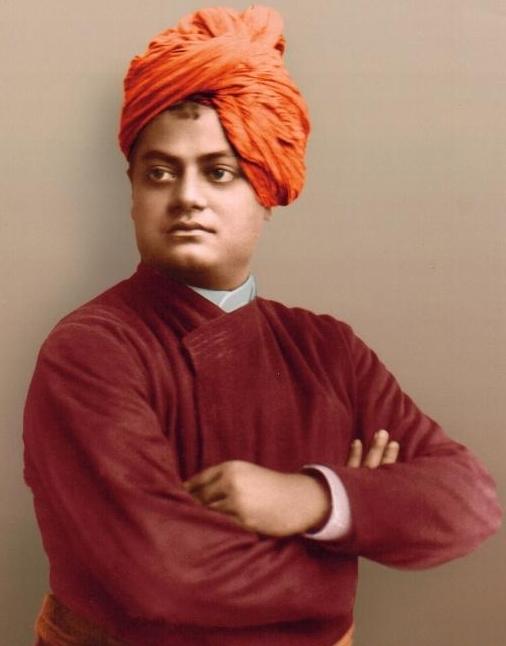
Leave A Comment